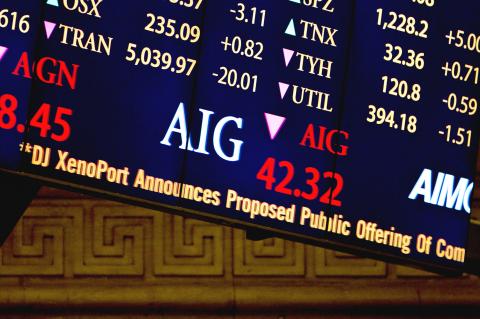Insurance conglomerate American International Group Inc (AIG) is taking a key step toward paying off a bailout that was at one point worth US$182 billion — the largest of the financial crisis.
The company said in a public filing on Wednesday that it would repay a loan from the Federal Reserve Bank of New York. AIG said that would clear the way for the US Treasury to sell off the government’s stake.
Treasury’s stake in AIG will temporarily rise from roughly 80 percent to 92 percent as part of the deal.

PHOTO: BLOOMBERG
During the height of the crisis, the New York Fed provided as much as US$91 billion in credit to AIG. As of early this month, AIG owed about US$21 billion.
Treasury officials would not comment on the government’s planned sales of AIG shares. They said the shares would be sold to maximize taxpayer profits and minimize the risk of loss.
“Today’s announcement is a milestone in the government’s long-stated efforts to exit our investments in private companies as soon as practical while protecting taxpayers,” US Treasury Acting Assistant Secretary for Financial Stability Tim Massad said in a statement. “When all is said and done, we believe taxpayers will recover every dollar invested in AIG and stand a good chance of making a profit.”
For months, the government expected to take massive losses on its investments in AIG. The nonpartisan Congressional Budget Office said last month that the rescue will cost taxpayers US$14 billion.
Wednesday’s filing moves the government closer to what Treasury officials expect will be a multibillion-dollar profit.
AIG and Treasury first described the plan in September.
Wednesday’s filing marks the official signing of the deal by AIG, the New York Fed and Treasury.
The filing “marks an important step forward in our progress toward completely repaying taxpayers. We remain committed to executing the steps and meeting all conditions in the agreement as soon as possible,” AIG said in a statement.
Treasury will convert its stake into about 1.66 billion shares, worth US$70.09 billion, based on Wednesday’s closing price. When the shares are sold, the proceeds will pay off the Treasury’s current US$47.5 billion investment in AIG, plus another US$22 billion that AIG will borrow to settle its obligations to the New York Fed.
The deal can’t be completed until AIG proves its strength by raising money from private investors and regaining a top rating from credit agencies.
“We hope to be able to go to the market with a public offering of AIG this spring, but we have work to do to make that happen,” AIG said in a statement. “We are working as diligently as we can to achieve this as quickly as possible, subject to market conditions.”
Trading of AIG shares was halted on Wednesday afternoon as news of the deal spread. AIG shares plummeted on Wednesday by US$1.73, or 4 percent, to US$42.22 before trading was halted.

BYPASSING CHINA TARIFFS: In the first five months of this year, Foxconn sent US$4.4bn of iPhones to the US from India, compared with US$3.7bn in the whole of last year Nearly all the iPhones exported by Foxconn Technology Group (富士康科技集團) from India went to the US between March and last month, customs data showed, far above last year’s average of 50 percent and a clear sign of Apple Inc’s efforts to bypass high US tariffs imposed on China. The numbers, being reported by Reuters for the first time, show that Apple has realigned its India exports to almost exclusively serve the US market, when previously the devices were more widely distributed to nations including the Netherlands and the Czech Republic. During March to last month, Foxconn, known as Hon Hai Precision Industry

Taiwan Semiconductor Manufacturing Co (TSMC, 台積電) and the University of Tokyo (UTokyo) yesterday announced the launch of the TSMC-UTokyo Lab to promote advanced semiconductor research, education and talent development. The lab is TSMC’s first laboratory collaboration with a university outside Taiwan, the company said in a statement. The lab would leverage “the extensive knowledge, experience, and creativity” of both institutions, the company said. It is located in the Asano Section of UTokyo’s Hongo, Tokyo, campus and would be managed by UTokyo faculty, guided by directors from UTokyo and TSMC, the company said. TSMC began working with UTokyo in 2019, resulting in 21 research projects,

Ashton Hall’s morning routine involves dunking his head in iced Saratoga Spring Water. For the company that sells the bottled water — Hall’s brand of choice for drinking, brushing his teeth and submerging himself — that is fantastic news. “We’re so thankful to this incredible fitness influencer called Ashton Hall,” Saratoga owner Primo Brands Corp’s CEO Robbert Rietbroek said on an earnings call after Hall’s morning routine video went viral. “He really helped put our brand on the map.” Primo Brands, which was not affiliated with Hall when he made his video, is among the increasing number of companies benefiting from influencer

Quanta Computer Inc (廣達) chairman Barry Lam (林百里) yesterday expressed a downbeat view about the prospects of humanoid robots, given high manufacturing costs and a lack of target customers. Despite rising demand and high expectations for humanoid robots, high research-and-development costs and uncertain profitability remain major concerns, Lam told reporters following the company’s annual shareholders’ meeting in Taoyuan. “Since it seems a bit unworthy to use such high-cost robots to do household chores, I believe robots designed for specific purposes would be more valuable and present a better business opportunity,” Lam said Instead of investing in humanoid robots, Quanta has opted to invest